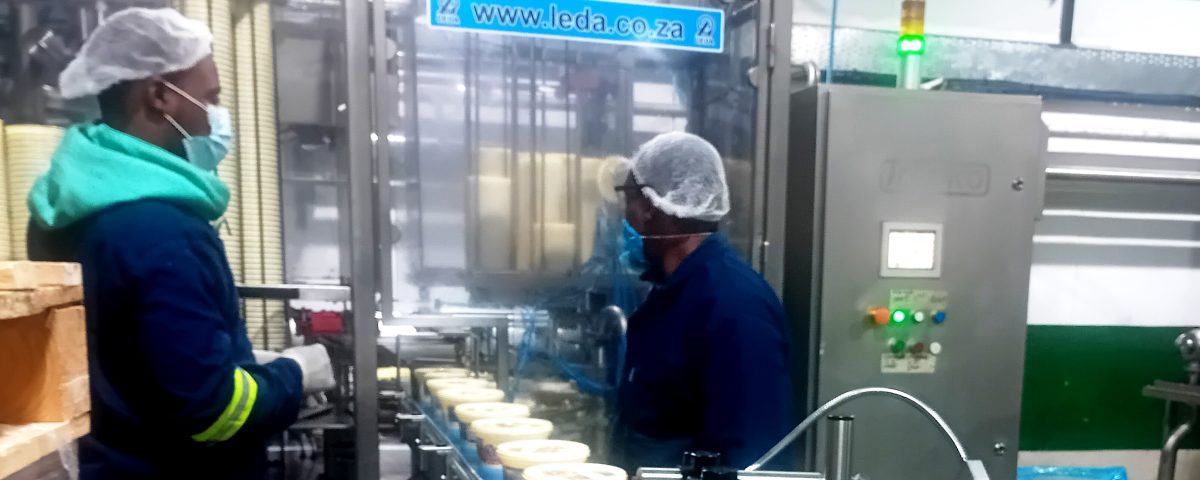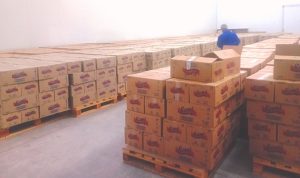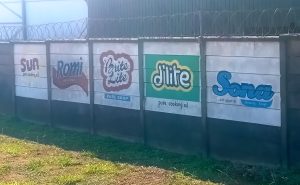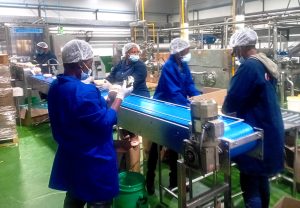
Zimbabwe’s affluent businessman Chivhayo impersonated in Facebook scams demanding money, promising US$20 000 to duped fans.
June 30, 2025
Smith regime legacy debt must be written off as an odious debt: ZIMCODD
July 14, 2025‘Industrialization will once again be revived in Mutare’s Nyakamete Industrial area’

Employees at work inside the semi automated Willowton Group Zimbabwe margarine plant.
…As new and future projects are brewing at Willowton Group Zimbabwe
Ngoni Dapira
THE leading producer of edible oils and soaps, Willowton Group Zimbabwe, will soon expand its production line as it aims to grow the franchise bigger. Already it expanded into margarine production this year but more products are in the pipeline, Easterntimeszim has learnt.

Basking in glory at the ZNCC Manicaland business awards Willowton project manager Sunil Kumar (black suit) and the Human Resources manager David Mudzazi show off the Manufacturing Exporter of the Year award.
The Mutare based company at the recently held Manicaland Zimbabwe National Chamber of Commerce (ZNCC) annual business awards scooped the top Manufacturing Exporter of the Year award which is carefully chosen by the Reserve Bank of Zimbabwe (RBZ). This is a remarkable achievement for a company that opened its doors barely 10 years ago in 2016 and built the entire factory production from scratch breathing new life into the moribund Karina Textile factory that had since shutdown in 2013.
In an interview with the general manager Gaurav Bhansali who was appointed in March this year after serving before as its head of finance and commercial, he revealed that more projects are brewing and they are happy with the market response of their first production batch from the margarine plant which started distribution on the market in May this year.

Boxes ready for delivery in the margarine factory refrigerator.
“We are working on a few things but we should be starting to export our margarine in the next three to four months to Mozambique, Malawi and Zambia. We want to go big on our margarine export,” said Bhansali.
The margarine plant is manufacturing the Romi low fat spread and Dlite margarine brand. The US$5 million semi-automated margarine factory that took over two years to construct comes in as an additional venture to Willowton Group Zimbabwe’s soap and cooking oil manufacturing plant that was already operational at the plant since 2016. The factory manufactures Sona bathing soap, Brite Lite laundry soap, D’lite cooking oil and Sunfoil cooking oil.

Bhansali said they are also in the process of manufacturing bakers’ fat, a baking product used in making bread, biscuits and other confectionery products. “In a month’s time we should start production of baker’s fat. However, the future of Willowton is in opening a soya beans crushing plant which will also lead to out-grower programmes for soya beans farmers, so we are thinking big,” he said.
Currently Willowton Group Zimbabwe is employing over 200 workers mostly because it is running a semi-automated factory in tandem with the times where digital technology is viewed to best transform the quality of work, higher output and increased productivity.
Its predecessor, Karina Textiles, which was the country’s sole manufacturer of knitting yarn, used to employ over 600 workers in its prime years. In 2013 the company applied for liquidation and eventually shut down its operations due to a myriad of challenges that backdated to the 2008 hyper inflationary period in the country. However, over the years in the digital era most industries have adopted lean manufacturing, a production philosophy focused on minimizing waste and maximizing productivity in manufacturing processes, which ultimately supports automation.
The automation debate in the digital era centres around the impact of automation technologies on the workforce, with concerns about job displacements. This debate includes both optimistic views that see automation leading to a future with less work and more leisure, whilst contesting views highlight the potential for mass unemployment and social unrest.

Some of the female workers in the margarine factory at work.
Bhansali however said semi automation is the only way they can operate competitively in the modern global economy where technology keeps evolving improving quality of work which changes market prices and demands drastically. “We do not want fully automated factories. We need to create jobs locally and that is what we do, especially women. We employ a lot of women in our company and even in administration work because we support the women empowerment drive in the country,” he said.

Willowton project manager Sunil Kumar receiving the company’s Manufacturing Exporter of the Year award at the ZNCC business awards from Minister of State for Manicaland Provincial Affairs and Devolution Hon Advocate Misheck Mugadza.
He added that they are also exploring investing in solar to ensure electricity supply at the plant. “Electricity plays a huge part in our production line since we have refrigerated goods and semi- automated production lines. We are also exploring investing in solar because backup generators are costly in the event of power cuts. We really hope the cost of electricity goes down as government is making efforts to invest more in renewable energy, but generally we are happy with the support we are getting to grow our business and promote re-industrialization in the country,” said Bhansali.


